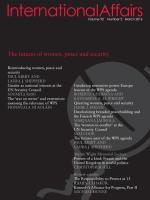Robust Peacekeeping, UN Bureaucracy and the Primacy of Politics
Increasingly, UN peacekeepers are deployed to places where there is no peace to keep. This challenges and undermines existing assumptions of what UN peacekeeping 'is'. A new article by DIIS Senior Researcher Louise Riis Andersen asks how this affects the identity of the UN peace bureaucracy and explores how the Secretariat is actively seeking to shape Member States' understanding of what UN peace operations can and cannot do. The article is published in International Affairs as part of a forthcoming special section on pragmatic approaches to peace, edited by Louise Wiuff Moe and Finn Stepputat.
To substantiate the claim that the UN Secretariat plays an autonomous role in debates over the future of peace operations, the article zooms in on the report from the High-Level Panel on Peace Operations (HIPPO) from 2015. The article interprets the HIPPO-report as a bureaucratic push-back against further militarization of UN peace operations. The HIPPO produced an alternative, more UN-like, vision for the future role of UN peace operations centered on the primacy of politics. In this way, the article seeks to take a step back from the ongoing debate on how to make UN 'fit for purpose' by asking for which purpose the UN civil servants wishes the world organization to be fit.

